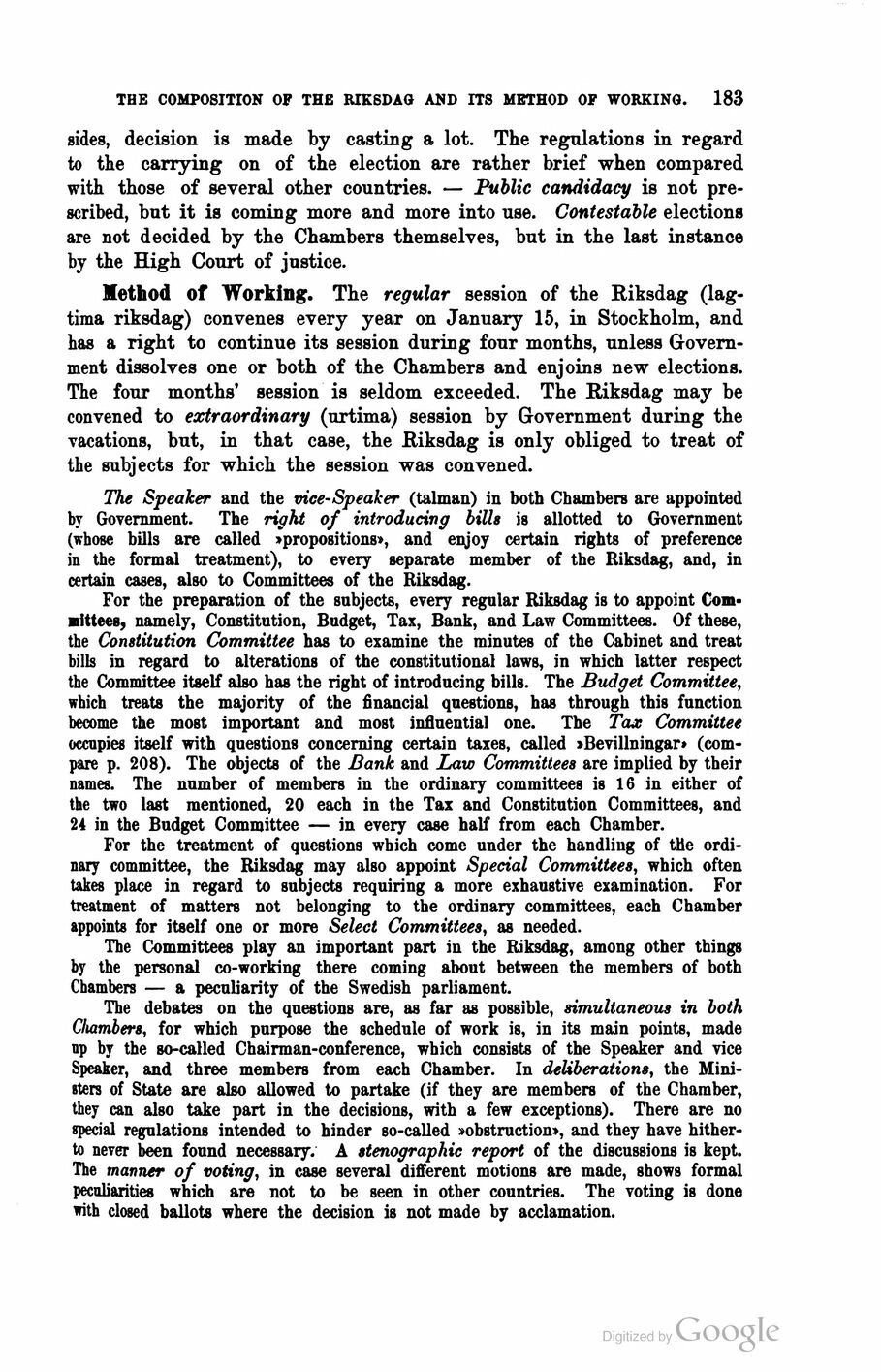
Full resolution (JPEG) - On this page / på denna sida - First part - III. Constitution and Administration - 1. Constitution - The Composition of the Riksdag and its method of working, by J. P. Velander, Ph. C., Stockholm

<< prev. page << föreg. sida << >> nästa sida >> next page >>
Below is the raw OCR text
from the above scanned image.
Do you see an error? Proofread the page now!
Här nedan syns maskintolkade texten från faksimilbilden ovan.
Ser du något fel? Korrekturläs sidan nu!
This page has never been proofread. / Denna sida har aldrig korrekturlästs.
THE COMPOSITION OF THE RIKSDAG AND ITS METHOD OF WORKING. 183
sides, decision is made by casting a lot. The regulations in regard
to the carrying on of the election are rather brief when compared
with those of several other countries. — Public candidacy is not
prescribed, but it is coming more and more into use. Contestable elections
are not decided by the Chambers themselves, but in the last instance
by the High Court of justice.
Method of Working. The regular session of the Riksdag
(lagtima riksdag) convenes every year on January 15, in Stockholm, and
has a right to continue its session during four months, unless
Government dissolves one or both of the Chambers and enjoins new elections.
The four months’ session is seldom exceeded. The Riksdag may be
convened to extraordinary (urtima) session by Government during the
vacations, but, in that case, the Riksdag is only obliged to treat of
the subjects for which the session was convened.
The Speaker and the vice-Speaker (talman) in both Chambers are appointed
by Government. The right of introducing bills is allotted to Government
(whose bills are called »propositions», and enjoy certain rights of preference
in the formal treatment), to every separate member of the Riksdag, and, in
certain cases, also to Committees of the Riksdag.
For the preparation of the subjects, every regular Riksdag is to appoint
Committees, namely, Constitution, Budget, Tax, Bank, and Law Committees. Of these,
the Constitution Committee has to examine the minutes of the Cabinet and treat
bills in regard to alterations of the constitutional laws, in which latter respect
the Committee itself also has the right of introducing bills. The Budget Committee,
which treats the majority of the financial questions, has through this function
become the most important and most influential one. The Tax Committee
occupies itself with questions concerning certain taxes, called »Bevillningar»
(compare p. 208). The objects of the Bank and Law Committees are implied by their
names. The number of members in the ordinary committees is 16 in either of
the two last mentioned, 20 each in the Tax and Constitution Committees, and
24 in the Budget Committee — in every case half from each Chamber.
For the treatment of questions which come under the handling of tbe
ordinary committee, the Riksdag may also appoint Special Committees, which often
takes place in regard to subjects requiring a more exhaustive examination. For
treatment of matters not belonging to the ordinary committees, each Chamber
appoints for itself one or more Select Committees, as needed.
The Committees play an important part in the Riksdag, among other things
by the personal co-working there coming about between the members of both
Chambers — a peculiarity of the Swedish parliament.
The debates on the questions are, as far as possible, simultaneous in both
Chambers, for which purpose the schedule of work is, in its main points, made
np by the so-called Chairman-conference, which consists of the Speaker and vice
Speaker, and three members from each Chamber. In deliberations, the
Ministers of State are also allowed to partake (if they are members of the Chamber,
they can also take part in the decisions, with a few exceptions). There are no
special regulations intended to hinder so-called »obstruction», and they have
hitherto never been found necessary. A stenographic report of the discussions is kept.
The manner of voting, in case several different motions are made, shows formal
peculiarities which are not to be seen in other countries. The voting is done
with closed ballots where the decision is not made by acclamation.
<< prev. page << föreg. sida << >> nästa sida >> next page >>